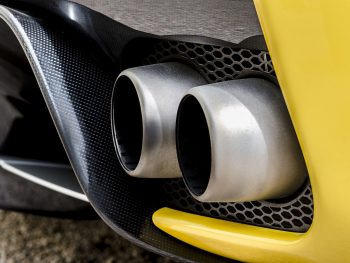EU lawmakers back 2035 end-date for combustion engine cars
The European Parliament has voted to set a 2035 deadline for all new car sales to be zero-emission, meaning the last fossil fuel cars will be sold by this date.

The vote is seen as a significant step forward for climate action, air quality and the affordability of electric vehicles by campaigners
It’s a move seen as a significant step forward for climate action, air quality and the affordability of electric vehicles by campaigners, although carmakers are urging MEPs and EU ministers to “consider all the uncertainties facing the industry” and implement a review in the run-up to the end-date.
MEPs voted to require carmakers to cut their average fleet emissions by 15% in 2025, compared to 2021, by 55% in 2030, and by 100% in 2035 – all parts of the European Commission’s ‘Fit for 55’ package of climate measures announced last year. A higher 2030 goal or higher targets in the 2020s were ruled out.
Green group Transport & Environment said the weak benchmarks would not spur enough action by carmakers this decade to help member states hit their climate goals – but added that the 2035 deadline would give a “fighting chance of averting runaway climate change”.
Alex Keynes, clean vehicles manager, outlined: “Phasing out combustion engines is also an historic opportunity to help end our oil dependence and make us safer from despots. And it gives the certainty the car industry needs to ramp up production of electric vehicles, which will drive down prices for drivers.”
T&E also welcomed the European Parliament’s rejection of a loophole for synthetic fuels in cars, which it said was the “latest fake ‘green’ solution of the fossil fuel industry which wants to prolong sales of new combustion engines beyond decarbonisation deadlines”.
T&E research published last 2021 had found that cars powered by synthetic fuel emit as much poisonous nitrogen oxides (NOx) as fossil fuel engines. Its new lifecycle analysis has also discovered that e-fuels would reduce the CO2 emissions of a car bought in 2030 by just 5%, on average, over its lifetime compared to petrol.
The European Automobile Manufacturers’ Association (ACEA) has also responded to the vote and said it now urges MEPs and EU ministers to consider all the uncertainties facing the industry, as it prepares for a massive industrial transformation.
While it’s welcomed the fact that the Parliament maintained the European Commission’s proposal for 2025 and 2030 targets – said to already be extremely challenging and only achievable with a massive ramp-up in charging and refuelling infrastructure – the association expressed concerns on the vote on a zero-emission target for 2035 and added that the transformation of the sector was dependent on many external factors “not fully in its hands”.
“The automobile industry will fully contribute to the goal of a carbon-neutral Europe in 2050. Our industry is in the midst of a wide push for electric vehicles, with new models arriving steadily. These are meeting customers’ demands and are driving the transition towards sustainable mobility,” stated Oliver Zipse, ACEA president and CEO of BMW.
“But given the volatility and uncertainty we are experiencing globally day-by-day, any long-term regulation going beyond this decade is premature at this early stage. Instead, a transparent review is needed halfway in order to define post-2030 targets.”
This review would need to look whether the deployment of charging infrastructure and the availability of raw materials for battery production would be able to match the “continued steep ramp-up” of battery-electric vehicles for 2035, Zipse said.
And the association is also calling on decision-makers to adopt the other elements of the Fit for 55 package – particularly CO2 targets and the Alternative Fuels Infrastructure Regulation (AFIR) – as one coherent package.
“Our industry is in the midst of a wide push for electric vehicles, with new models arriving steadily. But given the volatility we are experiencing globally, any long-term regulation going beyond this decade is premature at this early stage,” Zipse continued.
Environment Ministers will decide their position on vehicle emissions targets later this month before entering into negotiations with the parliament. The final law is expected to be agreed in autumn.







